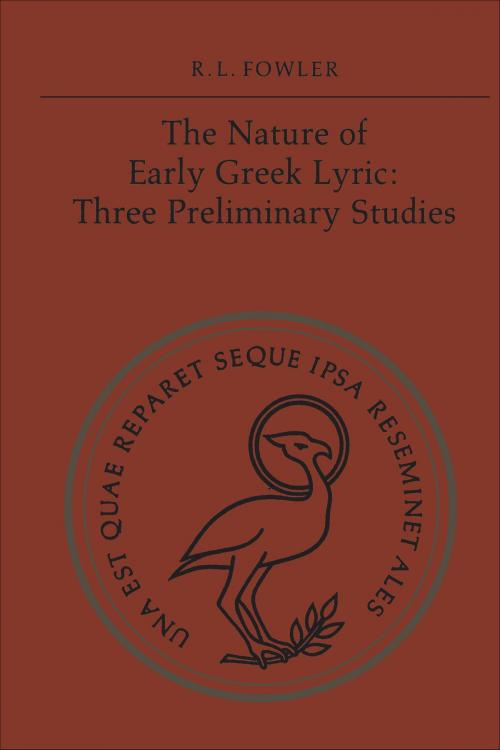The Nature of Early Greek Lyric
Three Preliminary Studies
Fiction & Literature, Literary Theory & Criticism, Ancient & Classical, Poetry History & Criticism| Author: | Robert L. Fowler | ISBN: | 9781487597184 |
| Publisher: | University of Toronto Press, Scholarly Publishing Division | Publication: | December 15, 1987 |
| Imprint: | Language: | English |
| Author: | Robert L. Fowler |
| ISBN: | 9781487597184 |
| Publisher: | University of Toronto Press, Scholarly Publishing Division |
| Publication: | December 15, 1987 |
| Imprint: | |
| Language: | English |
Three important literary questions in early Greek lyrics are addressed in this study. First, Fowler attempts to determine the extent that Homer and epic poetry generally influenced the lyric poets, with respect to both the style of compositions and their content. Identifying the certain examples of influence – which are far fewer than often thought – he analyses the technique of imitation, tracing a development from simpler to more complex as the archaic period proceeds. Throughout this and the following chapter, he often finds occasion to take issue with the famous and influential view of the early Greek mind championed by Bruno Snell and Hermann Fränkel.
In the second chapter Fowler studies the organization of individual poems, identifying compositional principles that may be used to solve literary and textual problems. Some of these principles, like ring-composition, are old familiars; others are not. All are found to be more pervasive than is often realized, and reflect an attitude to composition rather different from the disorderly and associative techniques traditionally ascribed to the lyrics poets.
The last chapter explores the nature of genres in the archaic period, starting from the vexed question of the definition of elegy. In all the genres associated with particular occasions, the author finds that the poets' professional skills and self-consciousness became more important than the purely occasional aspects of their composition. Observations of interest are made on, among others, citharodic songs, epigrams and epinician odes; and elegy in the end turns out, paradoxically, not to be a true genre at all.
Three important literary questions in early Greek lyrics are addressed in this study. First, Fowler attempts to determine the extent that Homer and epic poetry generally influenced the lyric poets, with respect to both the style of compositions and their content. Identifying the certain examples of influence – which are far fewer than often thought – he analyses the technique of imitation, tracing a development from simpler to more complex as the archaic period proceeds. Throughout this and the following chapter, he often finds occasion to take issue with the famous and influential view of the early Greek mind championed by Bruno Snell and Hermann Fränkel.
In the second chapter Fowler studies the organization of individual poems, identifying compositional principles that may be used to solve literary and textual problems. Some of these principles, like ring-composition, are old familiars; others are not. All are found to be more pervasive than is often realized, and reflect an attitude to composition rather different from the disorderly and associative techniques traditionally ascribed to the lyrics poets.
The last chapter explores the nature of genres in the archaic period, starting from the vexed question of the definition of elegy. In all the genres associated with particular occasions, the author finds that the poets' professional skills and self-consciousness became more important than the purely occasional aspects of their composition. Observations of interest are made on, among others, citharodic songs, epigrams and epinician odes; and elegy in the end turns out, paradoxically, not to be a true genre at all.















